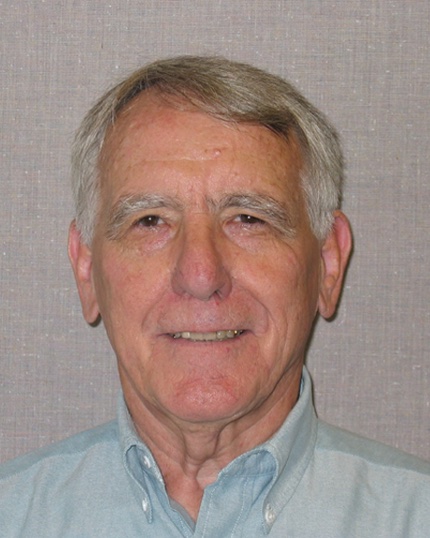
Richard Lander, distinguished professor emeritus of physics, passed away on April 19, 2024. He was 95 years old (4 days shy of his 96th birthday).
Richard became a pioneer and leader in what was then a relatively new field of physics, experimental high energy particle physics. Lander joined the Physics Department faculty in 1967 as an Associate Professor to start an experimental high energy particle physics group. His forte was detector design and development, the hardware of experimental physics. In his words “the basic goal is to identify the directions, momenta and identity of all the (sub-atomic) particles emanating from a collision;” in other words, the discovery of the ultimate nature of the universe. He loved working with his team to design and build equipment and spending time monitoring data acquisition at the accelerators (atom smashers). His research took him all over the world to wherever there were accelerators. The program he built at UCD was highly successful in obtaining continuous funding and is still thriving and involved in forefront work in the field. Richard made seminal contributions to the CMS detector, one of the two large experiments which discovered the Higgs boson in 2012. Richard remained at UC Davis until his retirement, and even after retirement he continued to come into the department to work with students and continue his work on developing new detector technology. He will be deeply missed.
Career History
Ph.D., University of California, Berkeley, 1957
Staff Physicist, Lawrence Radiation Laboratory, 1957-1960
Research Specialist A, The Boeing Company, 1960-1961
Assistant Research Physicist, University of California, San Diego, 1961-1963
Associate Research Physicist, University of California, San Diego, 1963-1966
Associate Research Physicist, University of California, San Diego, 1963-1966
Associate Professor, University of California, Davis, 1967-1971
Professor, University of California, Davis, 1971-2008
Honors
- Fellow, American Physical Society
- 2013 European Physical Society High Energy and Particle Physics Prize, for an outstanding contribution to High Energy Physics, awarded to the ATLAS and CMS collaborations, for the discovery of a Higgs boson, as predicted by the Brout-Englert-Higgs mechanism.
- 2019 High Energy and Particle Physics Prize of the EPS for an outstanding contribution to High Energy Physics, awarded to the CDF and D0 Collaborations, for the discovery of the top quark and the detailed measurement of its properties.
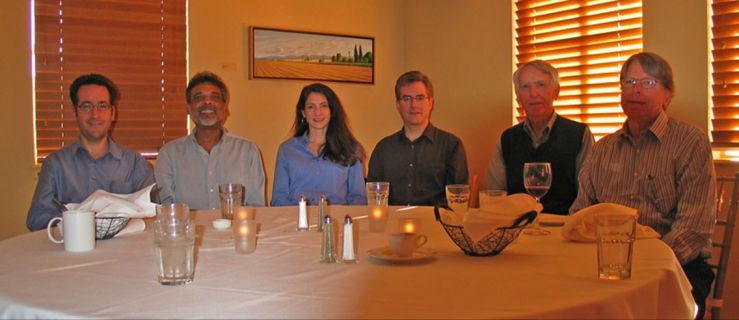
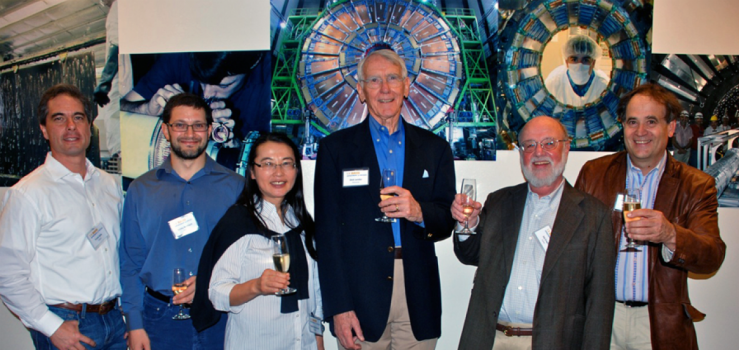
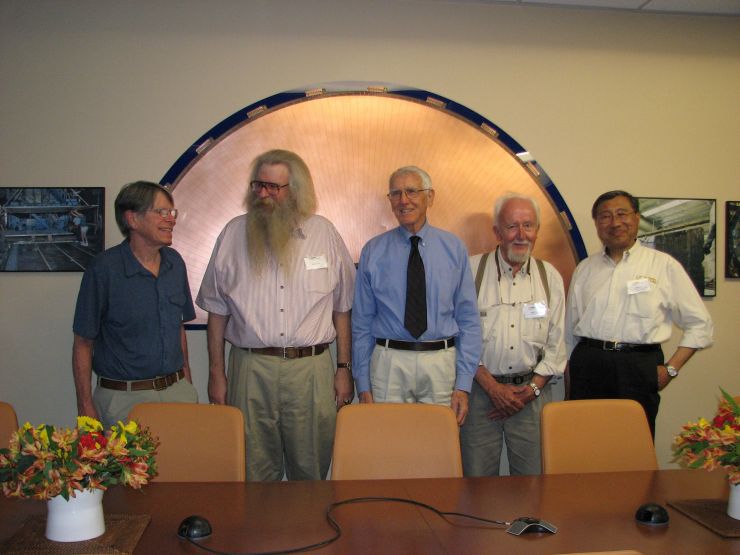
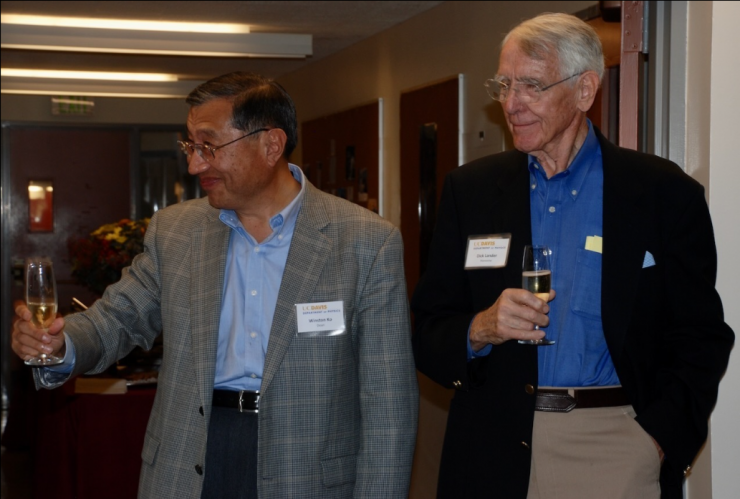
Memories and Personal Stories of Richard Lander
From Linda Lowenstine
Richard Leon Lander
April 23, 1928 - April 19, 2024
Richard (“Dick”) Lander, Distinguished Professor Emeritus, was born at home on Outlook Avenue in Oakland to Mabel (Morton) and Erik Lander, the third of 5 children. He passed away at his home west of Davis (4 days shy of his 96th birthday) from complications of dementia and a recent hospitalization. Dick was fascinated by the physical world even as a boy when he wondered why a ball thrown in the air behaved in a certain way. He grew up in Alameda where he and his brothers would try to sneak out of the house to go to beach before his mom could give them chores. They built a boat in the living room which his mother made them remove to their bedroom. Their father had to dismantle a window to get it out. Dick’s father had emigrated from Sweden and Dick was very proud of his Swedish heritage. He kept in contact with his Swedish cousins and visited the family farm (which has been in the family since the 1700s) several times, the last one being in 2019.
Dick attended Alameda High where he was tied for valedictorian. He was a member of ROTC and was in the reserves, but never called up because of his field of study. He earned an BS in physics at UC Berkeley. Money was tight and Dick worked many odd jobs learning lifelong skills as diverse as window washing, wood working and surveying. He remembered having only a dime and having to choose between a candy bar and a trolley ride home. A year at the Ohio State earned a Master’s degree in physics and the awe of his classmates as the crazy guy from California would walk across campus in the winter in his shirt sleeves. He returned to Berkeley for his PhD and was awarded a postdoctoral Research Physicist appointment at Lawrence Berkeley Radiation Laboratory. He met and married his first wife, Doris Jahnke, and they had two sons, Erik and Keith. The family briefly moved to Seattle where Dick was a Senior Research Scientist at Boeing and where daughter Laurie was born. They returned to California where Dick was an Assistant and, later, Associate Physicist at the newly established University of California, San Diego. Dick was recruited to UC Davis in 1967 as an Associate Professor to start an experimental high energy particle physics group. Dick and Doris parted ways and Dick met his future wife and life partner, Linda Lowenstine, in 1975. Although they had no children as a couple, they were heavily invested in the upbringing of their beloved grandson, Laurie’s son John-Mark.
Dick became a pioneer and leader in what was then a relatively new field of physics, experimental high energy particle physics. His forte was detector design and development, the hardware of experimental physics. In his words “the basic goal is to identify the directions, momenta and identity of all the (sub-atomic) particles emanating from a collision”; in other words, the discovery of the ultimate nature of the universe. He loved working with his team to design and build equipment and spending time monitoring data acquisition at the accelerators (atom smashers). His research took him all over the world to where ever there were accelerators: SLAC at Stanford University, Brookhaven on Long Island, Fermi Lab outside of Chicago, DESY in Germany, CERN in Switzerland, KEK in Japan. The program he built at UCD was highly successful in obtaining continuous funding and is still in existence. Dick made seminal contributions to the CMS detector, one of the two large experiments which discovered the Higgs boson in 2012. Dick remained at UC Davis until his retirement, and even after retirement went into the department to work with students and continue his work on developing new detector technology.
Although it was research that he loved, he was also a good teacher. He had an ability to explain difficult concepts to both children and college students. He mentored undergraduate physics majors, graduate students, post-docs and younger faculty.
When Dick was finally convinced to travel for pleasure, he and Linda visited Egypt, Jordan, Greece and Turkey (with John-Mark), Alaska, Antarctica, Australia, Botswana, Belize, Baja California, Panama and Hawaii. There were also many trips to the UK and Europe that combined research or scientific meetings with visits to family and friends, and road trips along the West Coast and to the Red Rock Country of the Southwest.
Dick was a genuinely kind human being and a man of integrity. Although he could have been described as a “workaholic”, he enjoyed sailing, hiking, good food, wine, an occasion single malt Scotch, dinners on the back deck with good friends, long drives through the California hills and mountains and along the coast, and gazing at the view of the ag fields and Blue Ridge and Vaca Mountains from his home west of Davis. He was a great dancer and had a lovely singing voice (though he did not always stick to the tune). He was a skilled draftsman and his pencil sketches of inanimate objects were stunning in their accuracy. He had a silly side and drew wonderful stick-figure cartoons and made up stories to entertain his children when they were young,
Dick is survived by his partner and wife of 48 years, Linda Lowenstine, sons Erik and Keith Lander, daughter Laurie Hopkins, grandson John Mark Hopkins III, his nieces and nephew and his Swedish cousins. Predeceased were his parents, brothers Robert, Don and Earl Lander and sister June (Belan) and several Swedish cousins. A private green burial was held at the Davis Cemetery.
The family wishes to thank his caregivers from Comfort Keepers, the staff at Sutter Davis Hospital, Sutter Cardiopulmonary Rehab, Sutter Care at Home, Sutter Home Hospice, the physicians at both Sutter and UCSF, and, especially, our primary care physicians, Drs Carl Eilers and Jennifer P. Clary, who contributed greatly to his longevity. A celebration of Dick’s life will be held at a later date. If you wish to honor his life, please send contributions to the Physics Quest Program at the American Physical Society or to a charity of your choice.
Memories of Dick can be shared on https://www.forevermissed.com/richard-leon-lander or a guest book can be signed on line at www.smith-funerals.com.
From Robin Erbacher
I will forever be grateful to Dick for taking a chance on me. I remember he came to a CDF collaboration meeting in which I gave an important plenary presentation, and he believed in me after that. He was instrumental in working with others in the group to hire me, even though they had been looking for collaborators who were already established on CMS.
Once I arrived at UC Davis, he was a kind and enthusiastic mentor for me, as well as a role model in work ethic, physics interest and excitement, and also a great friend. Even after retirement I would see him in the department on weekends and other times, devoted to physics. Thank you Dick. Linda: sending you and your family my sincerest condolences on your loss.
From Rena Zieve
As a Davis physics professor in a different field, condensed matter experiment, I was amazed at how much Dick was around the department after his retirement and heart surgery. He probably spent much more time with the particle experiment grad students then than before his retirement. They weren't officially his grad students, but he was the professor who was around the most when the grad students had questions. He was very hands-on as well; I used the third-floor clean room for a brief stretch during that period and saw Dick there often. I'm glad he had that chance to get back into the lab after having the responsibility of leading the particle experiment group for so long.
From Richard Scalettar
Dick was an important mentor to me from my first days as an Assistant Professor and through all my years in the Department. He had an incredible wealth of wisdom as well as a genuine concern for what was best for the overall good. He often ended his emails to me with "Respectfully submitted, Richard Lander" and this closing was meaningful- Dick's comments and thoughts were always filled with respect for the opinions and concerns of others. I could not imagine a better colleague.
From John Rundle
When I first came to Davis from the University of Colorado, Dick was one of the faculty that truly made me feel welcomed. I shall miss his wisdom, his wit, and his advice.
From Kai Liu
Dick was among the first that welcomed me when I started as an Assistant Professor at UC Davis, in a different field of Experimental Condensed Matter Physics. I greatly benefited from his teaching advice, when I had to teach my first large lower division course, as well as his wisdom on how things worked on campus, all before I learned how iconic a figure he had been for the High Energy program. Always appreciated his wit and sharpness, calling things out as he saw it. Even once we got into a feisty argument. Later on he reached out, and we got to talk it out and laughed it off. We completely understood each other afterwards. I particularly appreciated how he applied his critical view in self-reflection also. I admire how much he had done for the field and for the department. Dick is greatly missed, and his legacy stays.
From Barry Klein
When I joined the Department of Physics in 1992, Dick Lander was immediately impressive to me for his passionate support of the department and his chosen field of high energy physics. As a newcomer to academia I absorbed the advice and wisdom of Dick and was always challenged by his insights and points of view -- Dick’s views were usually right on the money. Dick was a department leader very well respected by his colleagues and always important to listen to. I developed a good personal relationship with Dick as the department evolved and I have very fond and respectful memories of us working together for the good of the department. He leaves behind a legacy of strong commitment, personal integrity and his contributions to the growth of the department. His friends, colleagues and family will continue to miss him, but the fruits of his labor will live on.
From Daniel Ferenc
A regular topic in my conversations with Dick was our mutual friend Tom Ypsilantis—Dick's colleague at Berkeley in the 1950s and mine at CERN until his death in 2000. Tom was both flamboyant and brilliant. With Dick’s passing, the intimate details of those historic times at Berkeley now fade with my memory. We often recounted how Tom, Chamberlain, and their colleague discovered the antiproton, a discovery worthy of a Nobel Prize. Yet, when Chamberlain respectfully invited director Segre to co-author the paper, Segre surprisingly accepted. Ultimately, Segre and Chamberlain received the Nobel Prize since the infamous limit is three people, a decision that Dick lamented every time we discussed it. Furthermore, Dick vividly evoked how Tom erupted in his (their?) office when an object—possibly teargas from student protests outside—flew in. This incident prompted Tom to not only quit his job, but to leave the U.S. permanently (he was born in Salt Lake City). Such memories, objects of beauty, are now never fully explored remnants of the past.
From Andy Albrecht
A regular topic in my conversations with Dick was our mutual friend Tom Ypsilantis—Dick's colleague at Berkeley in the 1950s and mine at CERN until his death in 2000. Tom was both flamboyant and brilliant. With Dick’s passing, the intimate details of those historic times at Berkeley now fade with my memory. We often recounted how Tom, Chamberlain, and their colleague discovered the antiproton, a discovery worthy of a Nobel Prize. Yet, when Chamberlain respectfully invited director Segre to co-author the paper, Segre surprisingly accepted. Ultimately, Segre and Chamberlain received the Nobel Prize since the infamous limit is three people, a decision that Dick lamented every time we discussed it. Furthermore, Dick vividly evoked how Tom erupted in his (their?) office when an object—possibly teargas from student protests outside—flew in. This incident prompted Tom to not only quit his job, but to leave the U.S. permanently (he was born in Salt Lake City). Such memories, objects of beauty, are now never fully explored remnants of the past.
From Joe Kiskis
In 1969 I was a senior in Dick's quantum mechanics class. One day he suggested he and I get a University car and drive down to SLAC. I hadn't been to SLAC before that. Dick introduced me to several people there, and I got to see some of the lab. We picked up a reel-to-reel tape with some experimental data and brought it back to Davis. That trip to SLAC played an important role in my decision to go to Stanford as a grad student. I am fortunate to have known Dick for so many years, and I am grateful for the many more ways in which he helped me in my life as a physicist beginning when I was an undergraduate student and then years later as a colleague on the physics faculty.
From Charles van Es
I have known Dick as a friend of my parents who would visit us with Linda from the US bringing wonderful gifts (bird watching books, 49-ers jackets!), an enthusiast for the world of science and physics, and a gentle soul. Sending warm wishes and hugs to Linda and all who loved him.
From Christopher Hill
Dick was my Ph.D. advisor at UC Davis. As I recall, he did not take that many students, but I wanted to work with him on CDF at Fermilab so I was persistent and he accepted me into his group (which had just joined that experiment). He was the perfect advisor for me, and I enjoyed my time working with him and the others at UCD, as we made an outsized impact on the silicon detector project we worked on. I learned a lot from Dick while I was there, but became even more fond of him after I left CA. As a professor at Ohio State now, I was tickled to discover that Dick had spent time here so many years ago. I regret not getting to see him on any of my more recent trips to UC Davis. I know we would have enjoyed good conversation about physics, politics, and many other things -- probably over a good bottle of Rombauer Zin, paired with a local rack of lamb (rare of course), and finished with a nice single malt. Thank you Dick, for everything. You will be missed.
From Vincent Boudry
I will always remember my first encounter with Dick at the DESY (Hamburg) coffee room in September 1993.
I was hired as a Post-Doc at UC Davis (as a part of my French military duty !), and only had email contacts with him; in those very early days of the internet, having only virtual contacts seemed quite unreal. I was relieved to see a very tall and friendly looking guy arriving, very real.
With Dick, everything seemed simple and natural.
The following 2 years were an exquisite experience, both on the physics and human side, thanks to Dick, John, and Mani.
The Davis Physics department always seems a bit like home.
Coincidentally, I was in Davis last week, the first time in 30 years, as a rapid stop during a family road trip in California. I had then a thought for all the colleagues.
From Thomas Muller
Please let me convey my heartful condolences for the loss of Dick Lander, colleague, friend and loved one to so many. I met Dick as one of the charter members of CMS in the US, together with Dave Cline, Winston Co, John Laytor, and off course many others) before we all formed the USCMS collaboration. In these founding years, I got to know Dick personally and to appreciate him highly. Unforgotten are our meetings at Davis and informal come-together at his home.
What makes me sad is to see a highly valued scientist and human pass away. What makes me happy is to know that Dick had a long, fruitful and fulfilled life. He achieved so much! And on a personal note: to have known him and also you at Davis!
Kind regards
Thomas
From Sudhir Malik
Sorry to hear this sad news. When I first started working on CMS Pixels in 1998/99 at Sidet, Fermilab, as a postdoc from Northwestern University, Dick and Gary Grim were the very first people that I met from UC Davis. My deepest condolences.

